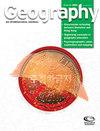Geography and Empire
IF 1.1
4区 社会学
Q2 GEOGRAPHY
引用次数: 0
Abstract
Geography has engaged in the study of empire since its early days as an academic discipline. Few disciplines have such a clear complicity with this political formation, that feeds on territorial growth through military power, and that limits political sovereignty in the peripheries. In fact, a temporal correspondence exists between the birth of modern geography and the emergence of a new phase of capitalist imperialism during the 1870s. Viewed as the queen of the imperial sciences over a century ago, geographies of empire have changed throughout time, reflecting the modifications in the discipline and the transformation in the nature of empires. During the late 19th and early 20th centuries, and under environmental determinism, geographical knowledge produced by the likes of Frederich Ratzel or Alfred Mackinder lent scientific credibility to ideologies of imperialism while, at the same time, they legitimized the scientific claims of geography as an academic discipline. Climatic and acclimatization studies and prerogatives were pivotal to construct moralistic considerations of both people and places. During the first half of the 20th century, geographies of empire were dominated, in part, by the regional tradition of French geographic inquiry, which cultivated a regional, zonal approach, while work with a focus on empire had a global and zonal tropicality architecture. Quantitative and neopositivist geography approaches in the second half of the 20th century had a less marked influence. Since the late 1980s, a concern for “empire” has returned to geography, and various subdisciplines have focused on the imperial genealogy of the discipline, the links between geography and empire, and the consequences of those links. A more critical engagement with the history of geography has provided contextual histories of global spatial practice and discourse over the past two centuries. The reconsideration of imperialism in view of postcolonial theory, tackling “historical amnesia,” has also promoted a new wave of studies. In a broad way we can be tempted today to make a division between geographical research, which participated in imperial development and maintenance, and geographical research “after Empire,” which aims to study and understand the past and present spatialities of empire.地理与帝国
地理学作为一门学科,从早期就开始研究帝国。很少有学科与这种政治形态有如此明显的共通之处,这种政治形态通过军事力量来促进领土扩张,并限制边缘地区的政治主权。事实上,现代地理学的诞生与19世纪70年代资本主义帝国主义新阶段的出现之间存在着时间上的对应关系。一个多世纪前,帝国地理被视为帝国科学的女王,随着时间的推移,帝国的地理发生了变化,反映了学科的变化和帝国性质的转变。在19世纪末和20世纪初,在环境决定论的影响下,弗雷德里希·拉策尔(Frederich Ratzel)或阿尔弗雷德·麦金德(Alfred Mackinder)等人产生的地理知识为帝国主义的意识形态提供了科学的可信度,同时,他们将地理学作为一门学科的科学主张合法化。气候和适应环境的研究和特权对于构建人和地方的道德考量至关重要。在20世纪上半叶,帝国地理学在一定程度上受到法国地理调查的地区传统的支配,这种传统培养了一种区域性、地带性的方法,而对帝国的研究则有一种全球性和地带性的热带结构。数量地理学和新实证地理学在20世纪下半叶的影响不那么显著。自20世纪80年代末以来,对“帝国”的关注又回到了地理学,各种分支学科都集中在该学科的帝国谱系、地理学与帝国之间的联系以及这些联系的后果上。在过去的两个世纪里,对地理历史的更批判性的参与提供了全球空间实践和话语的背景历史。从后殖民理论的角度重新审视帝国主义,解决“历史健忘症”,也推动了新的研究浪潮。从广义上讲,我们今天很容易将地理学研究与“后帝国”地理学研究区分开来,前者参与了帝国的发展和维持,后者旨在研究和理解帝国的过去和现在的空间性。
本文章由计算机程序翻译,如有差异,请以英文原文为准。
求助全文
约1分钟内获得全文
求助全文
来源期刊

Geography
GEOGRAPHY-
CiteScore
1.70
自引率
21.40%
发文量
21
期刊介绍:
An international journal, Geography meets the interests of lecturers, teachers and students in post-16 geography.
 求助内容:
求助内容: 应助结果提醒方式:
应助结果提醒方式:


